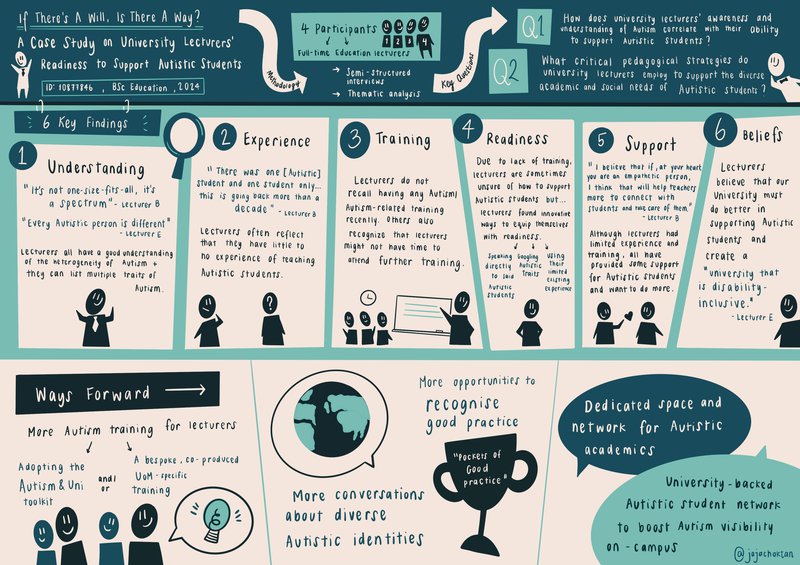If There’s A Will, Is There A Way? A Case Study on University Lecturers’ Readiness to Support Autistic Students
- Interview
- Teacher
- Education
- Higher education
- Special Educational Needs and Disability (SEND)
- Policy
- Perspectives
About a year before writing this dissertation, I stumbled across a University of Birmingham article titled: “Mind the gap: What is missing in the autism research agenda?” in which I read a poignant story of Jim Simpson: “Jim Simpson, an autistic author and activist in the US, tells a story of meeting a child with autism. The child was amazed to meet Jim. Having never heard of an adult who had autism, he had assumed that autistic children died before they grew up.” Reading this made me realise that I had an integral role in ensuring that all children believe they will grow up and can blossom in their own space. My dissertation's main aim was to better understand how lecturers support autistic university students, specifically at the University of Manchester. This was done by answering two key questions: Q1: How does university lecturers’ awareness and understanding of autism correlate with their ability to support autistic students? and Q2: What critical pedagogical strategies do university lecturers employ to support the diverse academic and social needs of autistic students? As a case study, this dissertation used semi-structured interviews to interview four lecturers in our University's Education field. Data were then inductively and thematically analysed. The findings reflect that: 1. Lecturers are adept at naming autistic traits and the varied presentation of autism, 2. Lecturers have minimal experience with autistic students, 3. Lecturers rarely have access to inclusion-related training, and more bespoke autism training needs to be provided to lecturers, 4. Lecturers have different ways of equipping themselves with skills to support autistic students, 5. Lecturers display high levels of willingness to support students, and 6. Lecturers highlight that all university stakeholders must contribute to developing an autism-friendly university. All of the findings can also be seen in the illustrated materials below. Therefore, taking inspiration from lecturers’ interview responses, the dissertation proposes plausible, practical changes for the university in this case study. Possible university-wide changes are as follows: 1. To adopt the Autism & Uni framework or develop a bespoke autism training, 2. To facilitate more university-wide conversations about intersectional autistic identities and recognise good staff support practices, and 3. To create dedicated spaces and visibility for autistic students and academics. However, it must be noted that, once again, due to the heterogeneity of autism and how universities operate differently, this suggestion is only applicable as a response to the findings of this dissertation as a case study. Moreover, research in this area is still sparse and collective efforts, involving autistic students themselves, can be a great way to begin tapping into best inclusive practices in higher education. For example, future research might decide to conduct university-specific focus groups with lecturers and autistic students, bridging any knowledge gap and co-creating materials to support autistic students.
At a glance, my dissertation is particularly important for key decision-makers at any given British university. From time constraints to sheer lack of knowledge, the dissertation illuminates some vital changes needed with university-wide inclusion training and support for staff. To support a marginalised group of students, we have to support the staff who are the gateway to these students’ success in education. If anything, the dissertation emphasised that lecturing staff are highly willing to support students but that universities are required to help pave the way for this to happen. On another note, this research contributes to an existing (albeit small) pool of participatory papers on autism. As an autistic person, more people (autistic or not) need to be able to read research written with some lived experiences in mind. One of the key things identified in the literature review leading up to this complete research found that autistic researchers are implicitly barred from writing ‘research that matters’ due to research bureaucracy and fears of getting the research methods ‘just right’. In consulting with writings from established autistic researchers in various fields, a 2022 paper by autistic research by Sandra Jones forefronts this debate, ensuring me that asking meaningful questions can be as valuable as being able to use technically complex research methods. Moreover, this research aims to reach children like those mentioned in Jim Simpson’s story. Currently, degree completion rates of autistic students are lower than those of who are non-autistic; employment rates also prove a similar gap. If someone as reading this summary and could feel a flicker of hope that good work is being done in higher education (HE) to make sure that people like them (or rather, like us) can be in HE, then this research has had its intended impact. Creating meaningful research requires all types of individuals, and I would not be at University writing my dissertation today if it were not for pioneers before me. Equally, if we carry any form of privilege with us, we must acknowledge it and use it to liberate others who are less able to do so. The Education research world might appear small and tight-knit, but it is wide enough for all of us.
Prize - Best Dissertation for BSc Education

